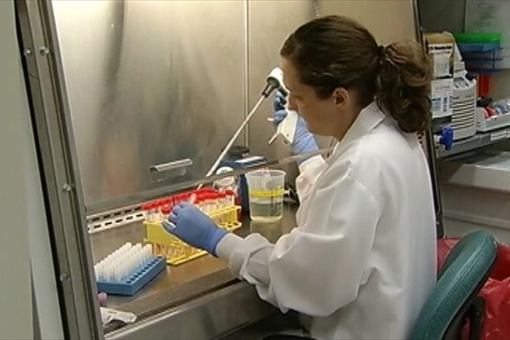Just recently, the first batch of experimental Ebola vaccines has arrived in Africa. It is a very limited quantity and only 200 frontline aid workers will be given the first doses. The experimental vaccine is called, cAd3-EBO Z, and is produced by Glaxo Smith Kline. According to the World Health Organization, the vaccine is based from chimpanzee virus that has been genetically altered so that it cannot replicate in the human body. Attached to this is one gene from the Ebola virus. Two hundred healthy volunteers in Britain, the U.S., Switzerland and Mali have already been vaccinated with this new vaccine. The results are very promising and the vaccine was approved to be tested on frontline workers in Africa.
Glaxo Smith Kline is not the only pharmaceutical company rushing to find an Ebola vaccine. Johnson & Johnson with Bavarian Nordic have come up with a non-virus vaccine. This vaccine requires two shots. One shot to prepare the immune system and one,a few months later, to boost the immune system. Because it contains no Ebola genes, there is no way to get the virus from the vaccination. Johnson & Johnson are just one step behind Glaxo Smith Kline and are finishing up their safety trials. With the approval of this vaccine, Johnson & Johnson has said they can have 2 million vaccinations ready by May of this year. Due to the nomadic behavior of some of the countrymen in Africa, the concern over people not returning for the second shot has been raised. As of now, the work will continue and is going forth with a two shot prescription.

Glaxo Smith Kline and Johnson & Johnson are not the only companies working on a vaccine. There are several others. The issue has become not only a race against the clock but funding. The cost to research these vaccines is astronomical and time to try to elicit funds is not a luxury that can be spared right now. That with having to wait to see results on test subjects is putting these other companies farther behind.
Fortunately, the most recent outbreak has abated, with only a few known cases popping up in the past few months. The largest concern is for cases that are not immediately reported. The fact that it is passed on by human to human contact and that it was able to reach 9 different countries in rather a short amount of time only shows the immediate need for these vaccines. One unreported case is all it would take to possibly lead to another outbreak. The CDC has stated that they recognize the seriousness of this and the urgency and is working to aid research in whatever way they can.
Although the first 200 people being vaccinated are frontline healthcare workers that will barely scratch the surface. There are about 1 million frontline workers that need the vaccination, and the vaccines just are not ready. The last outbreak saw thousands upon thousands infected, resulting in 8,641 deaths. These statistics are frightening. In Liberia, Sierra Leone and Guinea there is a need for 12 million vaccines alone.
Some people have voiced their concern about the speed at which these vaccines have been made. The reality is that the search for an Ebola vaccine has been in the works for years. It has only been since this past outbreak that pharmaceutical companies have been able to find funding and progress in continued production of these vaccines. The Center for Disease Control and The World Health Organization are holding the pharmaceutical companies to the strictest of standards and are following their every move. The goal is to have the safest, most effective vaccine available within the next few months.
Mark Sadaka is a vaccine injury lawyer who represents numerous clients from around the country. Sadaka’s firm has the resources and expertise necessary to successfully handle these medically complex cases. Go to Vaccine Injury Help Center if you have a vaccine related injury.


